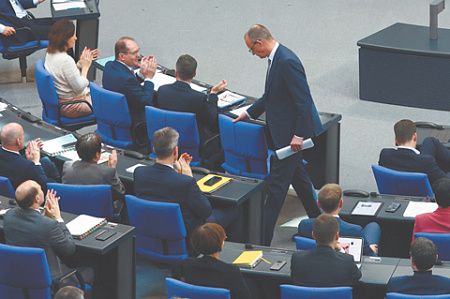
The activities of the black-red government of Germany, created to develop a coalition agreement, which should be headed by the leader of the Christian Democrats (CDU) Friedrich Merz, have been interrupted. The media believe that Mertz will have to forget about forming a cabinet of ministers before Easter. It’s all about the exact opposite concepts with which the partners in the proposed coalition began work on its creation.
Despite the solid foundation created by the decision of the old Bundestag, which was supported by the Chamber of Lands and has already been approved by Federal President Frank-Walter Steinmeier, to amend the Constitution to create an extra-budgetary fund, fundamental contradictions have already surfaced between the conservative CDU/CSU bloc and the party of the left middle, which is considered the Social Democratic Party of Germany (SPD).
On one of the recent talk shows on the Second Channel of German television ZDF, it was claimed that it was the coming to power of the new isolationist administration in the United States that was a kind of last straw in Merz’s decision to take on debts specifically for the purpose of German rearmament. The first “bell” rang in the Migration working group. It should be recalled that during the election campaign, Merz adopted from the right-wing populists their harsh anti-immigration proposals on the introduction of permanent border controls and the immediate expulsion of illegal migrants, preventing them from entering German soil. Needless to say, this calls into question the principle of freedom of movement in the Schengen area.
According to media reports, not all the working groups were able to prepare the necessary documents, but the main bone of contention was the issue of migration. Apparently, the Social Democrats would prefer the harsh anti-immigration measures proposed by Merz to be temporary rather than permanent.
It is assumed that the party leaders will intervene in the conflict in the Migration working group, who will be able to resolve it. But the situation negatively affects both the image of the parties and Merz himself. According to the INSA Institute for the Study of Public Opinion, the ratings of the CDU/CSU and the SPD have already fallen to 26% and 15%, respectively. On the other hand, the popularity of the Alternative for Germany (24%) and the Left Party (10%) is growing.
These indicators are important for the upcoming land elections and for the situation in political parties, which are likely to undergo significant leadership changes. First of all, we are talking about the SPD. The internal party situation is affecting the work of the working groups on the preparation of the coalition agreement. Each of the contracting parties is trying to defend its positions so that the party masses cannot reproach them with anything at the congresses where the coalition agreement will have to be approved.
For Merz, the situation is becoming particularly alarming. In party circles, he is openly reproached for deviating from fundamental positions related to the inadmissibility of increasing government debt. It is worth recalling that, according to some reports, he just used this issue to achieve a crisis in the previous “semaphore” coalition on the problem of public debt with the help of the “marketeer” Christian Lindner. As a result, the then finance minister, the free Democrat Lindner, broke up the coalition. This was the collapse of his personal political career and the defeat of his party in the snap elections, because the Free Democratic Party did not get into the Bundestag.
Merz, after a radical 180-degree turn on the issue of public debt, has earned a reputation as an unscrupulous politician, and now he needs to stick to the ideas with which he went to the polls.
The obvious difficulty of forming a new government prompted one of the ZDF moderators to suggest that both the Social Democrats and the Conservatives are not too willing to sit with each other in the same government.
